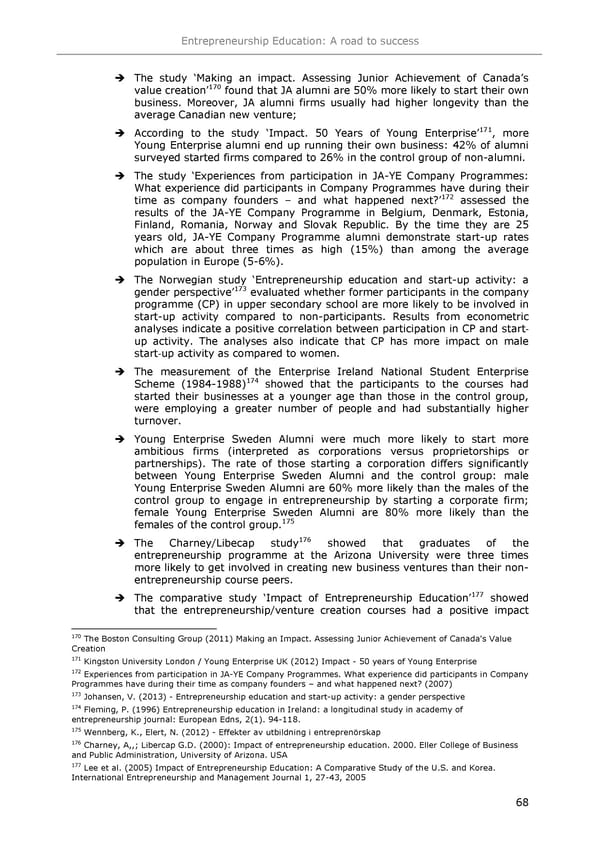Entrepreneurship Education: A road to success The study 8Making an impact. Assessing Junior Achievement of Canada9s 170 value creation9 found that JA alumni are 50% more likely to start their own business. Moreover, JA alumni firms usually had higher longevity than the average Canadian new venture; 171 According to the study 8Impact. 50 Years of Young Enterprise9 , more Young Enterprise alumni end up running their own business: 42% of alumni surveyed started firms compared to 26% in the control group of non-alumni. The study 8Experiences from participation in JA-YE Company Programmes: What experience did participants in Company Programmes have during their 172 time as company founders 3 and what happened next?9 assessed the results of the JA-YE Company Programme in Belgium, Denmark, Estonia, Finland, Romania, Norway and Slovak Republic. By the time they are 25 years old, JA-YE Company Programme alumni demonstrate start-up rates which are about three times as high (15%) than among the average population in Europe (5-6%). The Norwegian study 8Entrepreneurship education and start-up activity: a 173 gender perspective9 evaluated whether former participants in the company programme (CP) in upper secondary school are more likely to be involved in start-up activity compared to non-participants. Results from econometric analyses indicate a positive correlation between participation in CP and start‐ up activity. The analyses also indicate that CP has more impact on male start‐up activity as compared to women. The measurement of the Enterprise Ireland National Student Enterprise 174 Scheme (1984-1988) showed that the participants to the courses had started their businesses at a younger age than those in the control group, were employing a greater number of people and had substantially higher turnover. Young Enterprise Sweden Alumni were much more likely to start more ambitious firms (interpreted as corporations versus proprietorships or partnerships). The rate of those starting a corporation differs significantly between Young Enterprise Sweden Alumni and the control group: male Young Enterprise Sweden Alumni are 60% more likely than the males of the control group to engage in entrepreneurship by starting a corporate firm; female Young Enterprise Sweden Alumni are 80% more likely than the 175 females of the control group. 176 The Charney/Libecap study showed that graduates of the entrepreneurship programme at the Arizona University were three times more likely to get involved in creating new business ventures than their non- entrepreneurship course peers. 177 The comparative study 8Impact of Entrepreneurship Education9 showed that the entrepreneurship/venture creation courses had a positive impact 170 The Boston Consulting Group (2011) Making an Impact. Assessing Junior Achievement of Canada's Value Creation 171 Kingston University London / Young Enterprise UK (2012) Impact - 50 years of Young Enterprise 172 Experiences from participation in JA-YE Company Programmes. What experience did participants in Company Programmes have during their time as company founders 3 and what happened next? (2007) 173 Johansen, V. (2013) - Entrepreneurship education and start-up activity: a gender perspective 174 Fleming, P. (1996) Entrepreneurship education in Ireland: a longitudinal study in academy of entrepreneurship journal: European Edns, 2(1). 94-118. 175 Wennberg, K., Elert, N. (2012) - Effekter av utbildning i entreprenörskap 176 Charney, A,,; Libercap G.D. (2000): Impact of entrepreneurship education. 2000. Eller College of Business and Public Administration, University of Arizona. USA 177 Lee et al. (2005) Impact of Entrepreneurship Education: A Comparative Study of the U.S. and Korea. International Entrepreneurship and Management Journal 1, 27-43, 2005 68
 Entrepreneurship Education Page 71 Page 73
Entrepreneurship Education Page 71 Page 73